
Features
Harvesting
Logging Profiles
Atlantic contractors report stable profit
Nov. 4, 2016 - Loggers in Atlantic Canada have been running lean for decades, so we weren’t surprised to learn that in general they are smaller and have not seen much in the way of rate increases in recent history. And while they tend to expect less profit than loggers elsewhere, they have been holding their own in terms of profitability.
November 4, 2016 By Scott Jamieson
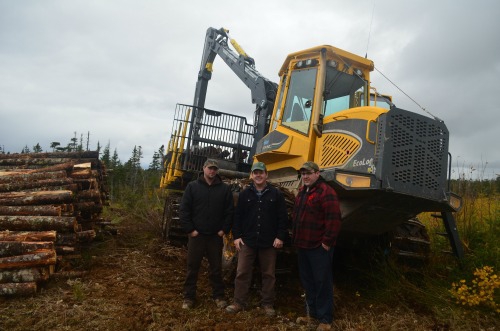
In general, Atlantic contractors reported the following:
Rates & profits
Based on the results of Canadian Forest Industries’ 2016 Contractor Survey, just 41 per cent of all contractors saw some form of rate increase over the past three years. For the majority, rates were either stagnant (28%) or had declined somewhat (23%), with 8 per cent preferring not to say.
On average, only contractors in Quebec fared worse on this front than those in Atlantic Canada. Only 17 per cent of Quebec loggers were able to negotiate a rate increase some time in the past three years, versus Atlantic Canada at 23 per cent. That compares to 63 per cent in the BC Interior and 45 per cent in Alberta.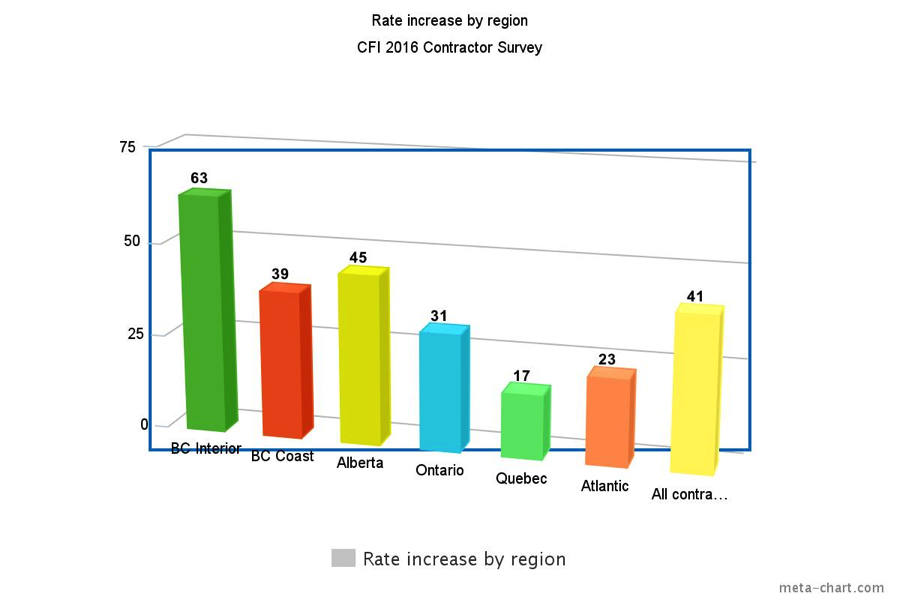
The overall profit profile in Atlantic Canada is similar to both Quebec and the national average, with 16 per cent seeing no profit, 11 per cent seeing a profit of 11 per cent or more, and just over a third (37%) getting by with 1 to 5 per cent margins. It’s worth keeping in mind that these average or slightly better than average margins are being made on well below average harvest volumes and revenue. Some 59 per cent of Atlantic contractors make less than $1 million in annual revenue, compared to 27 per cent on average making that little and 12 per cent in the BC Interior.
A combination of lower fuel prices and better volumes also means that the average contractor here is holding on to what they have a little better than those in the rest of Canada. Over half (53%) say their margins are higher or the same as they were three years ago, compared to an average of 49 per cent. More telling, only 21 per cent of Atlantic contractors say their margins have shrunk, versus 41 per cent on average.
Operator pay
Operator rates in Atlantic Canada are among the lowest in Canada, with the bulk (80%) paying their operators $11 to $20/hr. The rest make $21 to $25/hr. In contrast, only three per cent of BC contractors and no Alberta contractors pay less than $26/hr. 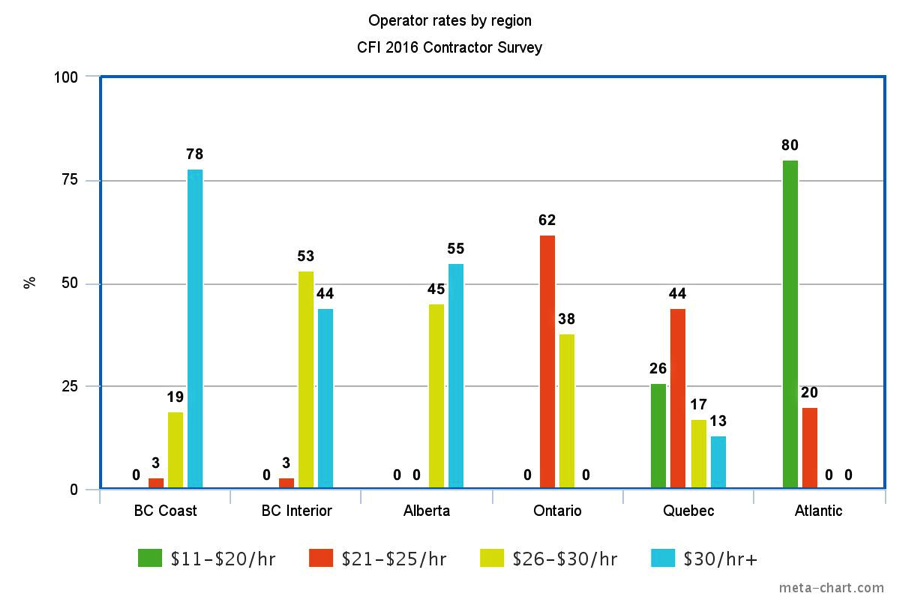
Trends in operator benefits follow closely, with over half (56%) providing no benefits at all, putting this region just slightly behind Quebec and Ontario, but well behind Western Canada. One third offer medical/dental, while 28 per cent offer life insurance. Overall, you can say the industry provides employment in this part of the country, but likely not on the high-end of the scale.
Workload
Contractors in Atlantic Canada work among the longest hours in the country, with 63 per cent claiming to work over 55 hrs/week, and almost three quarters (74%) working over 51 hrs/wk. These are both above average but more telling well above neighbouring Quebec, where 38 per cent work over 55 hours per week.
As elsewhere, that life/work balance is out of whack with most of the general economy, and will likely be a hurdle when attracting the next generation of logging contractors in many of these regions.
Company size
Any way you measure it, Atlantic contractors are among the smallest in the country, with 58 per cent having five or fewer employees (national average is 24%), 59 per cent making $1 million in annual revenue or less (27% national ave.), and 52 per cent having six or fewer machines (30% ave.). Exactly 80 per cent also harvest 50,000 m3/yr or less, compared to a national average of just 25 per cent harvesting in that range.
Atlantic contractors are also less likely to be replacing gear over the next two years, with 44 per cent saying they have no plans to buy new equipment, and an additional 44 per cent saying they will replace just one or two pieces. That compares to 88 per cent on average who will be replacing some gear, with the bulk of those replacing three or more machines.
On the flip side, smaller operations with fewer employees and machines mean a lower barrier to entry for the next generation of loggers. Barriers to entry appear to be far lower in Quebec and Atlantic Canada than anywhere west of Montreal.
Mill consolidation
Loggers are generally faced with fewer and fewer mills to sell their products and services to, a general concern that affects some regions more than others. Atlantic Canada sits mid pack when it comes to the number of mills potentially buying fibre in their region. Not quite half (44%) of contractors in Atlantic Canada report that there are four or more mills in their region, trailing regions like the BC Coast and Ontario for diversity.
Thanks in large part to a variety of species and products, Atlantic contractors are more likely than most to actually sell to this range of mills, with 60 per cent selling to three or more mills. That compares to just 26 per cent in the BC Interior and 20 per cent in Alberta. Still, consolidation varies dramatically by region in Atlantic Canada, with one third of loggers here selling to just one mill.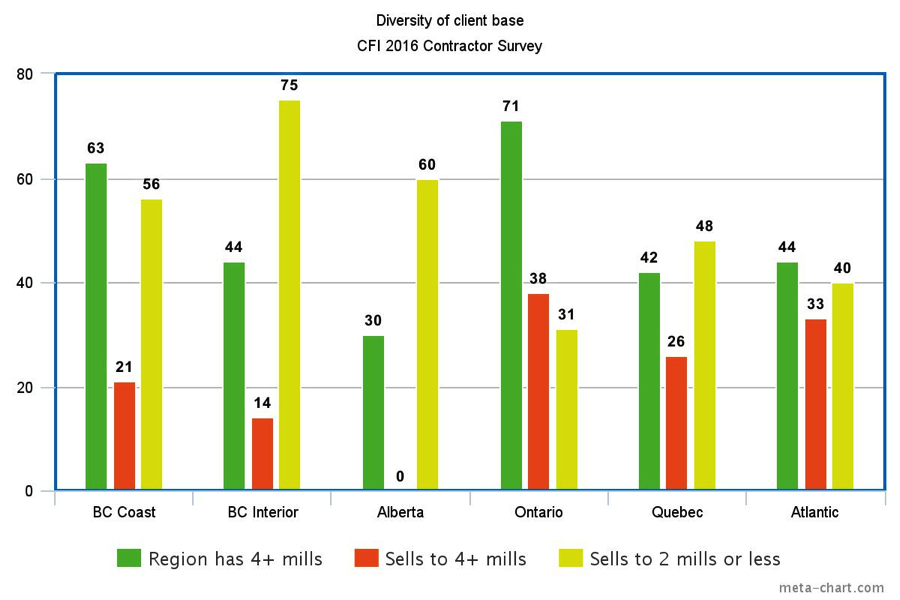
Contractor age
Atlantic contractors are among the oldest in Canada, with 36 per cent being 56 years old or more, 65 per cent being over 46 years old, and the highest percentage in Canada over 65 years old (13%). That is far older than Quebec’s loggers, where less than half as many loggers are 46 and older (32%), and where 42 per cent are under 35 (that group represents just 9% in Atlantic Canada). This region joins Ontario and the BC Coast in facing a massive changing of the guards.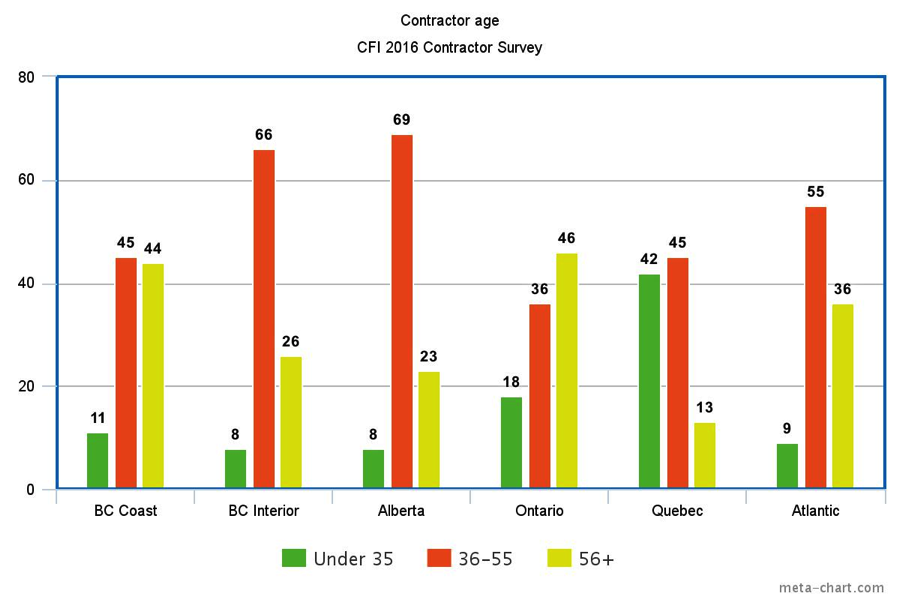
The next generation
That age breakdown, as well as retirement plans, makes succession planning a possible nightmare in Atlantic Canada. The good news is that these folks expect to work late in life – just 36 per cent expect to leave the industry in less than 10 years compared to a national average of 56 per cent. And with the exception of Quebec, loggers here are more open to having their kids take over than elsewhere in Canada – only 18 per cent explicitly don’t want their children taking over.
On the other hand, 64 per cent have no succession plans at all, which is something to consider, as is the fact that loggers here are the least likely to actually have children in the business and working to take over. Succession remains more theory than planning here.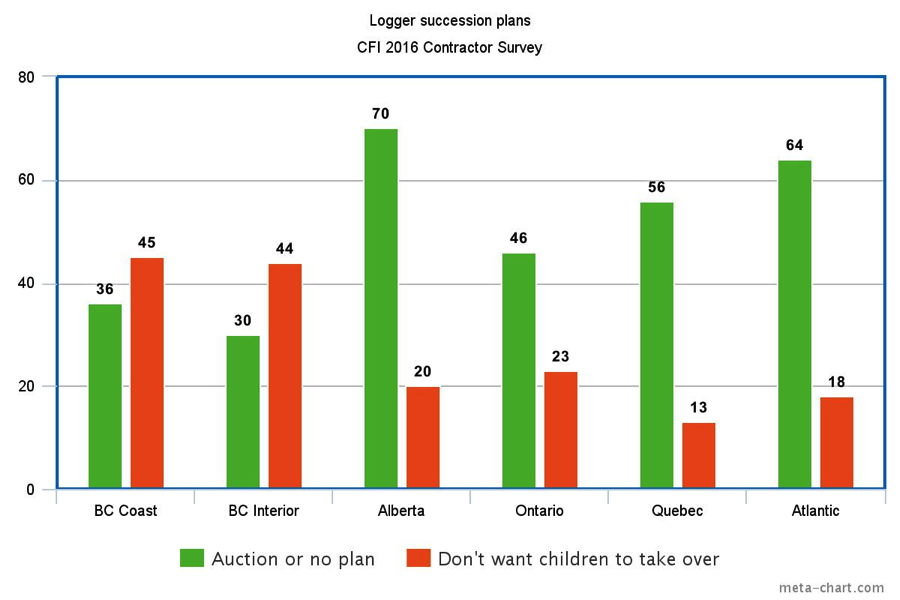
The Canadian Forest Industries 2016 Contractor Survey was conducted in April 2016 for Canadian Forest Industries and Operations forestieres et de scierie by independent research firm Bramm & Associates, generating over 230 replies to a detailed list of questions. Many thanks to our sponsors for making this vital research possible – Hultdins, Stihl, Tigercat and Ponsse.
Print this page